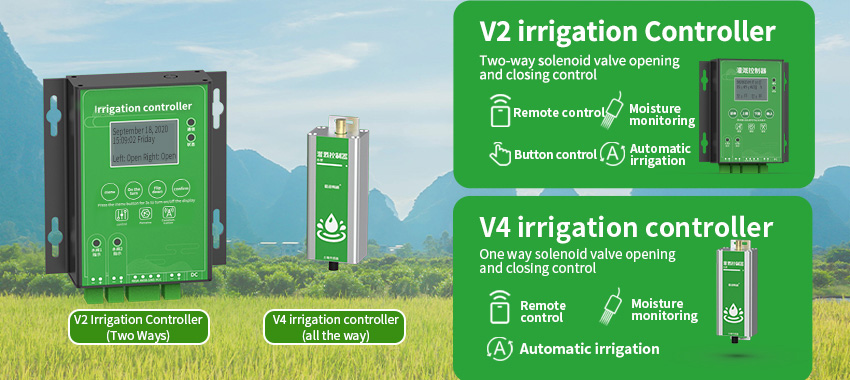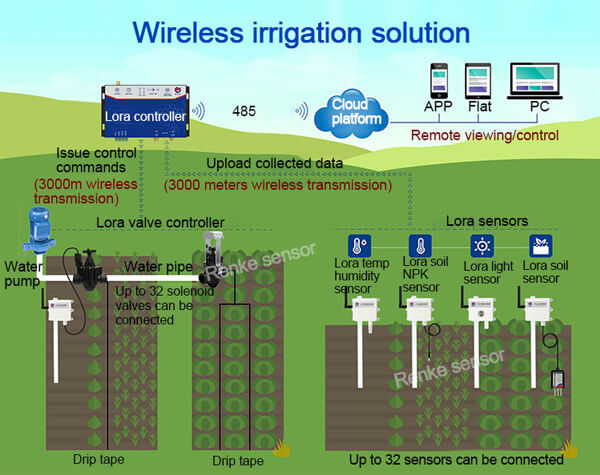Irrigation Controller
In recent years, the use of irrigation controller has gained significant prominence in improving water management practices. This article explores the role of irrigation controllers in facilitating efficient water usage and sustainable agricultural practices.

As one of the important means of saving water in agriculture, irrigation controller plays an important role in water resources management. This paper will introduce the functions and advantages of irrigation controllers in order to improve the public’s understanding of irrigation controllers and promote their application in water conservation and water resource management.
Irrigation controller and its function
Irrigation controller is a kind of equipment used for automatic control of irrigation process, its main function is to carry out intelligent control of irrigation water through the monitoring data of soil moisture sensor, meteorological sensor and other equipment, so as to achieve water saving and improve irrigation efficiency. Irrigation controller can automatically adjust irrigation time and irrigation water amount according to soil moisture, meteorological conditions and other parameters to ensure the water required for normal growth of crops, while avoiding waste of water resources. In addition, the irrigation controller can also perform irrigation operations at scheduled times according to a preset program to achieve automated agricultural management.
Second, the advantages of irrigation controller in efficient water management
Water saving: The irrigation controller can accurately control the irrigation water consumption and time according to soil moisture and meteorological conditions, so as to avoid the waste of water resources. Compared with traditional irrigation methods, the use of irrigation controller can significantly improve irrigation efficiency and save water consumption.

Improve crop yield: The irrigation controller can precisely control the irrigation water consumption and time according to the growth needs of the crop and soil conditions, ensuring that the crop gets enough water during the growth period, thereby improving the yield and quality of the crop.
Reduce labor costs: The use of irrigation controllers can achieve automated and intelligent irrigation operations, reducing labor costs and labor intensity. At the same time, because the irrigation controller can accurately control the irrigation water consumption and time, it can avoid the problem of misoperation and waste caused by human factors.
Environmental protection: By using irrigation controllers, pollution and damage to soil and the environment caused by over-irrigation and over-fertilization can be avoided. At the same time, reducing water consumption can also reduce the consumption and waste of water sources and protect the ecological environment.
Improve agricultural production efficiency: By using the irrigation controller, you can precisely control the irrigation water consumption and time, improve the yield and quality of crops, and thus improve agricultural production efficiency. In addition, because the use of irrigation controllers can reduce labor costs and water consumption, it can also reduce agricultural production costs and improve the market competitiveness of agricultural products.
Third, future development trend
With the continuous progress of science and technology and people’s attention to water resources management, irrigation controllers will develop in a more intelligent and accurate direction. In the future, the irrigation controller will integrate more sensors and intelligent algorithms to achieve comprehensive monitoring and control of irrigation water and crops, and improve the intelligent degree of agricultural production and water-saving effect. In addition, with the development of technologies such as the Internet of Things and cloud computing, irrigation controllers will also realize connection and data sharing with the Internet, improving the information level and management efficiency of agricultural production.
conclusion
In short, as one of the important means of efficient water management, irrigation controller has multiple advantages such as water saving, increasing crop yield, reducing labor cost and protecting environment. With the continuous progress of science and technology and the enhancement of agricultural water-saving consciousness, irrigation controller will be more widely used. However, in order to better play its role, it is necessary to further strengthen the work of technology research and development, promotion and application, and policy support. At the same time, it is also necessary to guide the majority of farmers to correctly use and maintain the irrigation controller, ensure its long-term stable operation, and make greater contributions to agricultural production and water conservation.